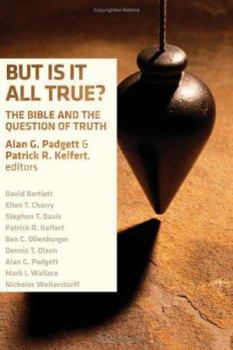But Is It All True?: The Bible and the Question of Truth
Fundamental to Christian faith is the assumption that the Bible presents a true and reliable portrait of God and God's will for the world. Yet thoughtful believers and nonbelievers alike continue to... This description may be from another edition of this product.
Format:Paperback
Language:English
ISBN:0802863167
ISBN13:9780802863164
Release Date:January 2006
Publisher:William B. Eerdmans Publishing Company
Length:175 Pages
Weight:0.65 lbs.
Dimensions:0.5" x 6.1" x 9.1"
Customer Reviews
2 ratings
A very complex look at a very simple question: what is truth?
Published by Thriftbooks.com User , 14 years ago
A compilation of various theologians & philosphers, this book views Biblical truth from historical, philosophical, & theological angles. Giving voice to the discussion are 9 different perspectives, ranging from deep philosophy to postmodern theology. As someone who is not well-versed in philosophical language, I found many of the essays to be too deep for the common reader. That is not to say there was no value in reading them, but I had to delve deep to glean nuggets of inspiration. This collection of essays definitely widened my understanding of truth, and I really appreciated the level of thought the authors put into it. I found the final essay by Charry to be helpful in giving the historical background of the premodern and modern lines of thought, and her exploration of the rise of scholasticism and faith as an intellectual assent vs. a relational pursuit of a good and happy life through knowing God were enlightening. I give this 4 stars out of 5 because sometimes I felt the writers used complex vocabulary that took away from relating the value of what they were trying to say. And, there were times where I felt that the concepts introduced were not given adequate discussion, particularly Stephen Davis' essay. He set up a premise and failed to deliver, in my mind. The book ends with the thought that God exists and that God is indeed knowable. How to know God is still debated, whether it be through sapiential theology or scholasticism. Perhaps it is a merger of both: the idea that God exists and wants us to know who God is so we will lead good and happy lives, helping others to do the same, coupled with the right beliefs about how to know such a God and to live such a life. Searching for truth? This book will not answer the question for you in simple terms, but it will give you multiple perspectives that can help you formulate your own answer to this pivotal question.
From Religious Studies Review (2007)
Published by Thriftbooks.com User , 16 years ago
* Chris Emerick, Regent University School of Divinity [from Religious Studies Review, 33 (2007), 120-121.] The essays in this handy volume demonstrate that C. Henry's view of truth is passing away. Henry argued that truth is reducible to true propositions. One of the main thrusts of this book is that truth is not simply (or even significantly) propositional, but entails ethical, existential, and aesthetic dimensions long overlooked. Thus, truth is not merely or even primarily the correspondence of assertions with reality, but involves relational dynamics, which transcend merely ostensive references dependent upon the now superseded subject/object bifurcation. Although there is no mention of him in the index, Brunner's legacy of construing truth as encounter is also advanced in this volume. Originally presented as conference addresses, the nine chapters nicely survey many of the contours of truth, sharpening one's focus upon the biblical text. For some conservative readers, the book is occasionally controversial, such as in Wallace's essay where he suggests that a hermeneutic of love would promote the inclusion of homosexual Christians into the full life and ministry of the church. But because the essays deal with these kinds of challenging topics, the book serves a key role in generating substantive discussion on the Bible and truth in the contemporary milieu. Benefits include essays on preaching and truth and a proposal for theological education, which entails the advance of Christian practices through rhetorical instruction. In sum, this volume points toward reconceiving truth as a way of life, a way of being-in-the-world, while not entirely rejecting more content-centered approaches.





